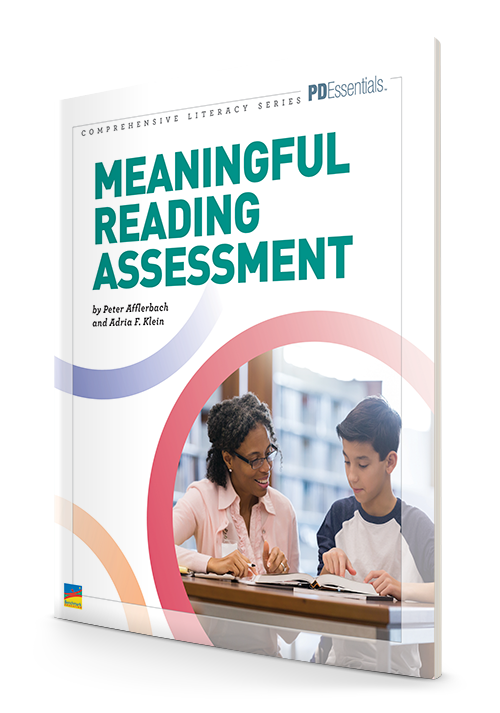The Sciences of Reading and Teaching Readers

by Peter Afflerbach, Ph.D.
In this blog I want to promote the idea that there are important sciences of reading (not a singular science of reading), and that these sciences can best inform our successful instruction. Much discussion of effective reading instruction focuses on the science of reading, which draws on research that describes the importance of cognitive skills and strategies. While skills and strategies are essential in reading development, research also describes the importance of other factors that make major contributions to readers’ success. These factors—including metacognition, motivation and engagement, and self-efficacy—have a documented influence on students’ reading development and reading achievement. Here, I propose that the science of reading is better portrayed as the sciences of reading because the sciences inform a more broadly-based instructional approach and understanding of student readers’ development. This allows us to provide effective instruction across the range of “must haves” that characterize healthy student readers.
How do our student readers develop? Why do some excel, while others struggle?
Answers to these questions typically describe students in terms of their reading strategies and reading skills. Thriving readers possess these cognitive strategies and skills, and are adept at word identification, fluency, vocabulary and comprehension. In contrast, weaker students may lack these abilities. Thus, the typical proposed solution to the struggling reader problem is teaching and re-teaching strategies and skills. This reflects a situation in which reading instruction is too often tied to a narrowly defined “science of reading.” Strategies and skills are essential for reading success, yet they are just one aspect of students’ reading development and reading achievement. Our most effective teaching should be based on a broader “sciences of reading,” which is informed by research from important, affiliated areas.
According to the science of reading, when we teach reading, we should focus on the strategies and skills that research demonstrates are essential for success. In contrast, when we teach readers, we can incorporate instruction for metacognition, motivation and engagement, and self-efficacy, in addition to strategy and skill. This allows us to address students’ individual differences across a broad and consequential set of factors. Combined, the sciences of reading describe the characteristics of students who thrive—and students who struggle—with their reading. Our understanding of how our instruction can best address each of these key areas of reading development will benefit our students.
Many of our accomplished students are on their way (if not already there) to being motivated and metacognitive and believing in themselves as readers. In contrast, struggling student readers have histories of negative encounters with reading that can have great influence on how they approach and perform in school reading. These students often have low self-efficacy. They do not believe that they will succeed because their prior experiences have taught them that reading does not go well. Related, students with low self-efficacy are often unmotivated and disengaged—which is a fairly natural approach for human beings who have low self-confidence and do not believe they will succeed. Struggling student readers often lack the key metacognitive strategies and mindsets that are needed to plan, work through, and succeed at reading and related tasks.
The following are sketches and suggestions related to three key sciences of reading. Each can help us foster reading excellence for all students.
Sciences of Reading: Metacognition
Metacognition is at the heart of students’ successful and independent reading. It stems from students’ reflective mindsets and helps them control their reading. Metacognition helps our students plan, work through, and complete their reading independently. It is involved in goal setting, comprehension monitoring, fix-it strategies, and evaluating near-and-far progress towards goals. Without metacognition, students flounder in managing their reading, exhaust their resources, and perform poorly. Those students may forever be dependent on someone else—usually a teacher or parent—to tell them how they are doing. Their ability to meet, address, and overcome reading challenges is missing.
Metacognitive strategies are close relatives to the ever-present cognitive strategies taught in reading classrooms. Fortunately, we can borrow teaching approaches that help students develop metacognitive strategies by explaining their nature and value, thinking aloud as we apply them, and scaffolding students as they become independently metacognitive.
Sciences of Reading: Motivation and Engagement
All accomplished teachers understand that motivation and engagement are fuel for the reading process. Our motivated and engaged student readers look forward to reading, concentrate while reading, bear down when difficulties are encountered, and complete their work with enthusiasm. We know that our best planned and best delivered instruction will not be effective if students are not motivated and engaged.
Consider fourth-grade students who have been members of the “low” reading group since starting kindergarten. These struggling 10 and 11-year-old readers may have spent one-half of their lives with “poor” reader experiences. This is hardly a motivating environment. Fortunately, the sciences of reading describe instruction and classroom environments that promote student readers’ motivation and engagement. This research tells us that motivation and engagement follow when students partake in meaningful learning, feel competent at the task, are given choices in what they read, and feel a sense of belonging in the classroom. In contrast, our students who struggle with motivation to read are often disengaged, and unable (or unwilling) to persevere. Students who struggle with motivation often feel like outsiders in the classroom, and do not see value in reading.
Sciences of Reading: Self-efficacy
Research in self-efficacy reminds us that students must believe in themselves to be able to succeed. Our students, like all human beings, gravitate to things they do well and avoid things that don’t work out. Thus, believing in themselves as readers is essential. As students develop, they encounter increasingly challenging texts and reading-related tasks. Looking across our classrooms, we see self-efficacy in students who approach each and every reading task with confidence and motivation. Prior reading experiences have taught these students that they are capable and that, much more often than not, they will succeed in reading. In contrast, our struggling students may regularly receive messages that they cannot succeed, and this diminishes or eliminates development of self-efficacy.
How can we promote students’ self-efficacy? It bears repeating that “Nothing succeeds like success!” As our students reflect on their success experiences, they can make connections to feelings of well-being, respect from teachers and fellow students, and the reward of a task done well. Research tells us that when students experience success—even a small one—they are able to grow their self-efficacy. They see themselves as readers who can succeed and take on increasingly challenging texts and tasks as they work through the school year. In addition, teachers who alert students to their good efforts and attempts to succeed can help even struggling readers build self-efficacy.
As the sciences of reading describe powerful factors that influence students’ reading development, it is important to consider our means of keeping track of achievement, above and beyond growth in reading strategies and skills. The Healthy Reader Profile (below, Afflerbach, 2022) can be used as a reminder of key outcomes of successful reading programs, and as a starting point for contemplating how, when, and where we can incorporate our knowledge of the sciences of reading into daily instruction.
Healthy Readers Profile
I include here a list of student behaviors and outcomes that I consider essential for student readers: the Healthy Reader Profile. It reflects outcomes of our successful instruction, as it is broadly based in the sciences of reading. You may find it useful as you contemplate how and if your reading instruction impacts these specific student behaviors. Please note that I include strategies and skills but place them in the final position, because they traditionally are the focus of reading instruction.
Metacognition
___ Planning and goal setting
___ Comprehension monitoring
___ Evaluating progress
___ Reading successfully and independently
Motivation and engagement
___ Approaching reading with enthusiasm
___ Appreciating the value of reading
___ Persevering when reading is challenging
Self-efficacy
___ Establishing the positive belief in self
___ Viewing one’s self as a capable reader
___ Expecting to succeed
Strategies and skills
___ Phonemic awareness
___ Word recognition
___ Fluency
___ Vocabulary
___ Comprehension
Conclusions
When we focus on the complex set of factors that influence reading development and achievement, we are in position to move beyond strategy and skill instruction and to focus also on students’ metacognition, motivation and engagement, and self-efficacy. Results of our instruction—of teaching readers—include students who strive to be independent, who believe in themselves as readers, and who carry with them a positive attitude towards reading and reading tasks. These students bring positive motivation to reading that feeds their engagement. The sciences of reading remind us of the central role that metacognition plays in students’ successful, independent reading. We must teach readers, and avoid teaching only reading. Teaching reading is informed by the science of reading, while teaching readers is informed by the sciences of reading. Indeed, accomplished teachers understand the value of students who are self-aware, who look forward to and engage with reading, and who believe they will succeed. Teaching readers does not result in diminishing our attention to strategy and skill; it requires that we attend to all of the factors that help student readers develop and achieve.
References
Afflerbach, P. (2022). Teaching readers (Not reading): Moving beyond skills and strategies to reader-focused instruction. New York: Guilford Press.
Afflerbach, P., Cho, B., Kim, J., Crassas, M., & Doyle, B. (2013). Reading: What else matters besides strategies and skills? The Reading Teacher, 66, 12-20.
What Next?
Join author Peter Afflerbach for an on-demand PD webinar, The Sciences of Reading: Metacognition, Motivation & Engagement, and Self-Efficacy. This webinar explores how, through consulting the Sciences of Reading—including metacognition, motivation and engagement, and self-efficacy—educators can access a more holistic instructional approach and understanding of student readers’ development, as well as effective approaches to teaching, related student learning outcomes, and how these outcomes are assessed.
Watch Now →
About the Author
 |
Peter Afflerbach, Ph.D., is Professor of Reading in the Department of Teaching and Learning, Policy and Leadership at the University of Maryland. His research includes focus on reading comprehension strategies and processes, verbal reporting, reading in Internet and hypertext environments, and mindfulness. He is the co-author of Meaningful Reading Assessment, Whole-Group Reading Instruction, and Small-Group Reading Instruction. |
You May Like: Meaningful Reading Assessment












Comments